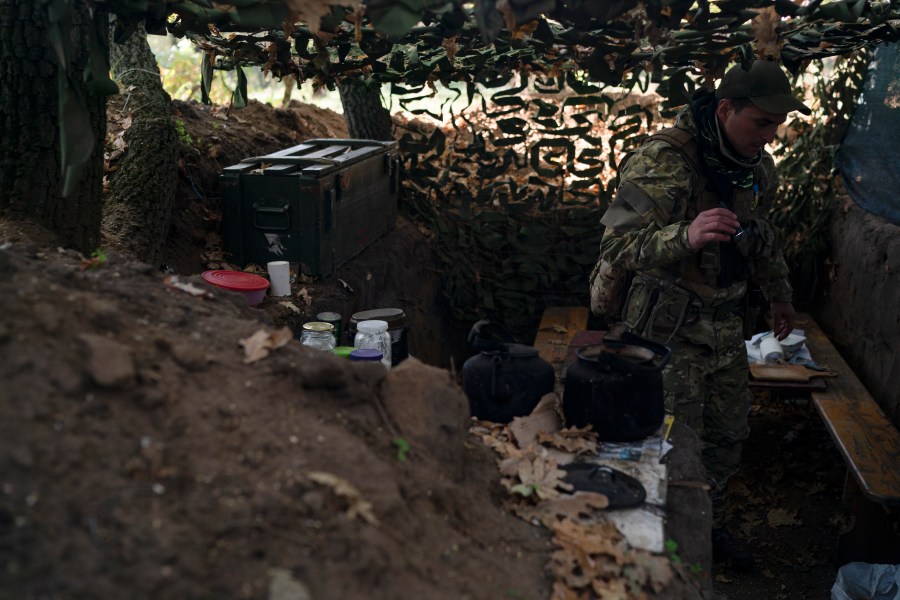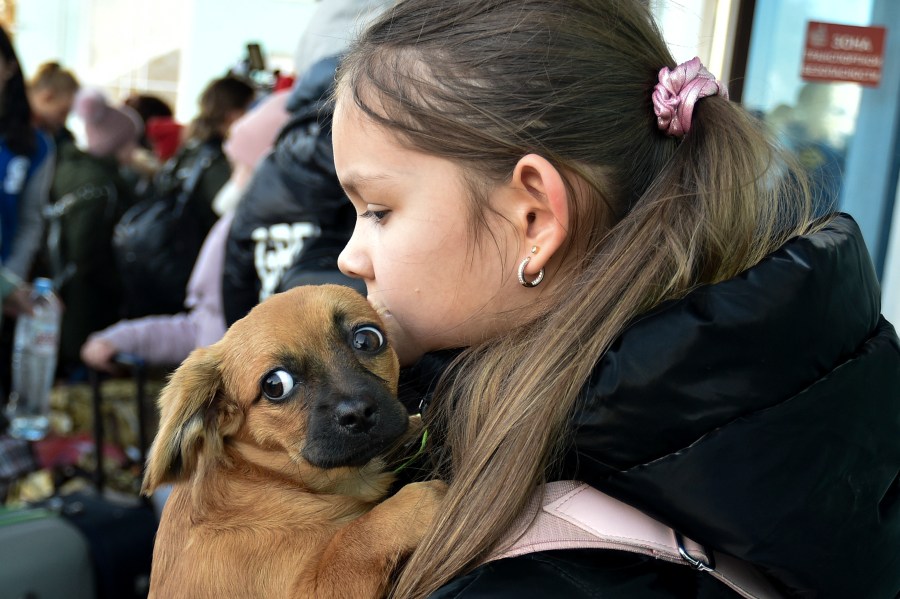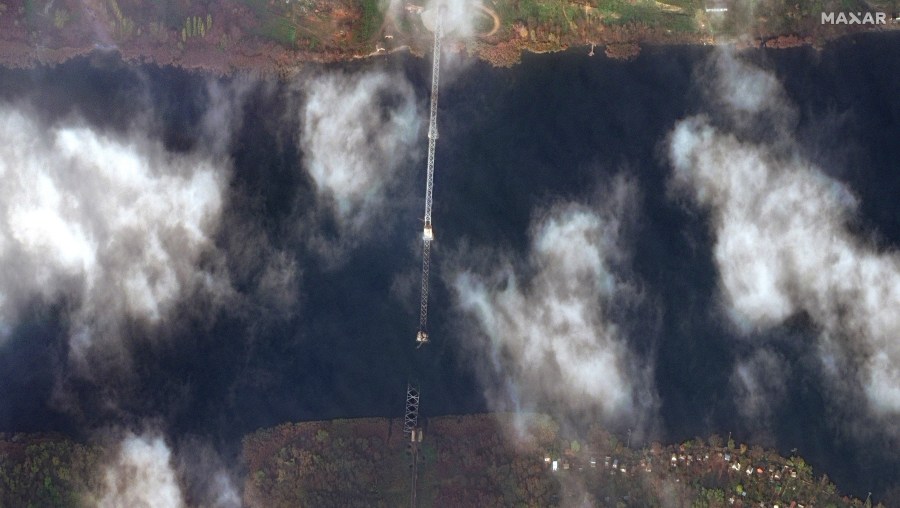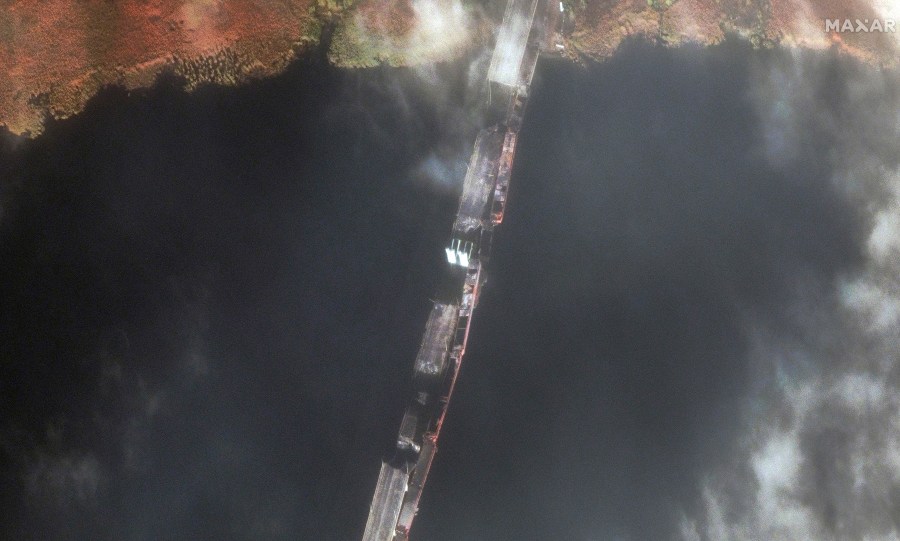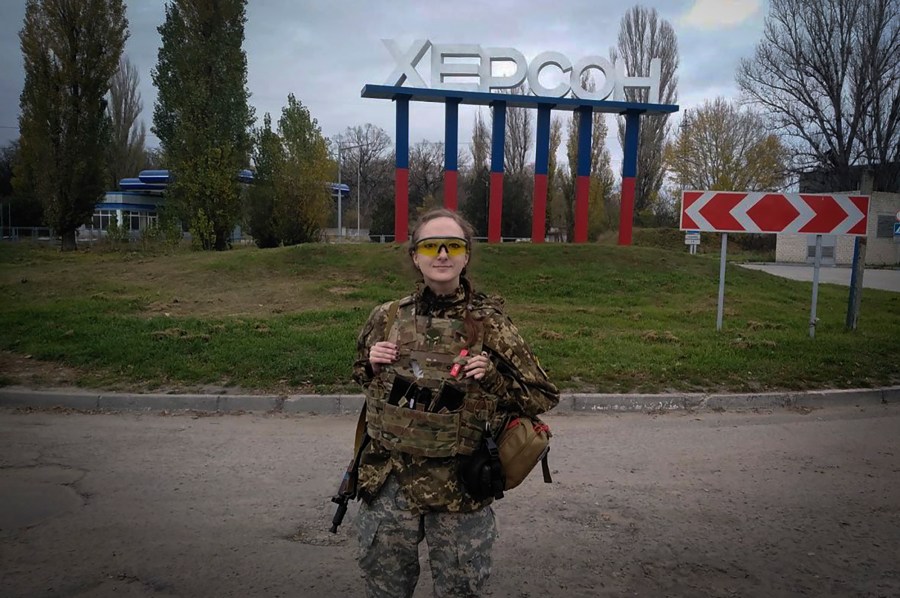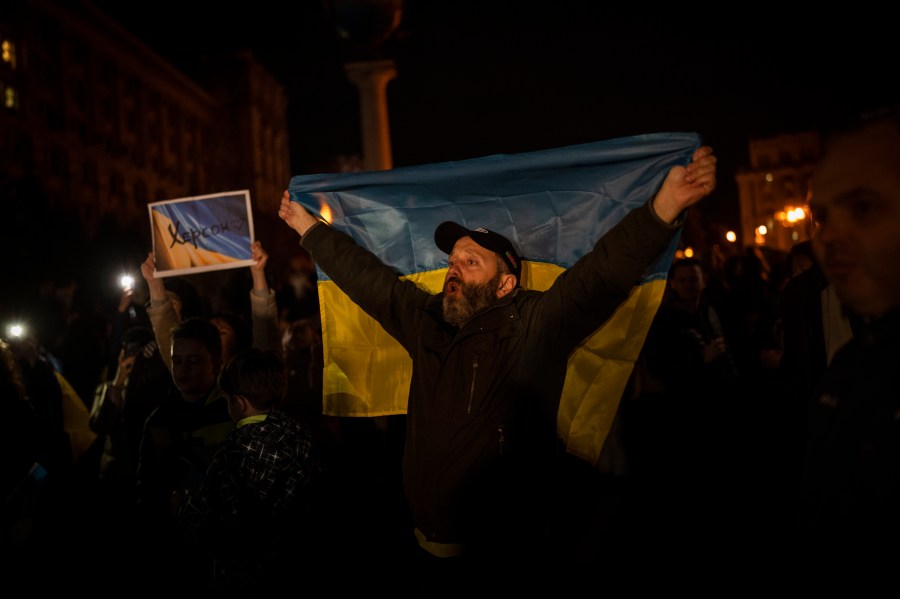MYKOLAIV, Ukraine (AP) — The Ukrainian military carried out “stabilization measures” near the southern city of Kherson on Saturday following the end of an eight-month occupation by Russian forces, a retreat that cast a further pall on President Vladimir Putin’s designs to take over large parts of Ukraine.
People across Ukraine awoke from a night of jubilant celebrating after the Kremlin announced its troops had withdrawn to the other side of the Dnieper River from Kherson, the only regional capital captured by Russia’s military during the ongoing invasion.
In a regular social media update Saturday, the General Staff of Ukraine’s armed forces said Russian forces were fortifying their battle lines on the river’s eastern bank after abandoning the capital. About 70% of the Kherson region remains under Russian control.
Ukrainian officials from President Volodymyr Zelenskyy on down cautioned that while special military units had reached Kherson city, a full deployment to reinforce the advance troops still was underway. On Friday, Ukraine’s intelligence agency said it thought some Russian soldiers stayed behind, ditching their uniforms for civilian clothes to avoid detection.
“Even when the city is not yet completely cleansed of the enemy’s presence, the people of Kherson themselves are already removing Russian symbols and any traces of the occupiers’ stay in Kherson from the streets and buildings,” Zelenskyy said in his nightly video address on Friday.
Photos circulating Saturday on social media showed Ukrainian activists removing memorial plaques put up by the occupation authorities the Kremlin installed to run the Kherson region. A Telegram post on the channel of Yellow Ribbon, a self-described Ukrainian “public resistance” movement, showed two people in a park taking down plaques picturing what appeared to be Soviet-era military figures.
Moscow’s announcement that Russian forces planned to withdraw across the Dnieper River, which divides both the Kherson region and Ukraine, followed a stepped-up Ukrainian counteroffensive in the country’s south.
In the last two months, Ukraine’s military claimed to have reclaimed dozens of towns and villages north of Kherson city, and the Ukrainian General Staff said that’s where the stabilization activities were taking place.
The Russian retreat represented a significant setback for the Kremlin some six weeks after Putin annexed the Kherson region and three other provinces in southern and eastern Ukraine in breach of international law and in the face of widespread condemnation. The Russian leader unequivocally asserted the illegally claimed areas as Russian territory.
Russian state news agency TASS quoted an official in Kherson’s Kremlin-appointed administration on Saturday as saying that Henichesk, a city on the Azov Sea some 200 kilometers (125 miles) southeast of Kherson city, would serve as the region’s “temporary capital” after the withdrawal across the Dnieper.
Ukrainian media derided the announcement, with the daily newspaper Ukrainskaya Pravda saying Russia “had made up a new capital” for the region.
Like Zelenskyy, Ukrainian Foreign Minister Dmytro Kuleba sought to temper the excitement over the invaded nation’s latest morale boost. “We are winning battles on the ground, but the war continues,” he said from Cambodia, where he was attending a meeting of the Association of Southeast Asian Nations.
Kuleba also brought up the prospect of the Ukrainian army finding evidence of possible Russian war crimes in Kherson, just as it did after the Russian Defense Ministry pulled back its forces in the Kyiv and Kharkiv regions earlier in the way.
“Every time we liberate a piece of our territory, when we enter a city liberated from the Russian army, we find torture rooms and mass graves with civilians tortured and murdered by the Russian army in the course of the occupation of these territories,” Ukraine’s top diplomat said. “It’s not easy to speak with people like this. But I said that every war ends with diplomacy and Russia has to approach talks in good faith.”
U.S. assessments this week showed Russia’s war in Ukraine may already have killed or wounded tens of thousands of civilians and hundreds of thousands of soldiers.
Despite the advances in Kherson, other parts of Ukraine continued to face civilian casualties, energy shortages and other fallout from Russian military attacks and Putin’s illegal annexation of Ukraine’s Kherson, Donetsk, Luhansk and Zaporizhzhia regions.
The state-owned electricity grid operator, Ukrenergo, announced emergency blackouts — which could go on indefinitely — in eight regions that included Kyiv, where a Russian military strike hit an energy facility critical to supplies to the capital.
Ukrenergo said scheduled one-hour blackouts, which are temporary and limited in time, also would continue daily in central and northern Ukraine.
Moscow has admitted to targeting Ukraine’s energy infrastructure with drone and rocket strikes since early October. Ukrainian officials reported said last month that 40% of the country’s electric power system had been severely damaged.
While much of the focus was on southern Ukraine, Russia continued its grinding offensive in Ukraine’s industrial east, targeting, in particular, the Donetsk region city of Bakhmut, the Donetsk region, the Ukrainian General Staff said.
Donetsk Gov. Pavlo Kyrylenko reported Saturday that two civilians were killed and four wounded over the last day as battles heated up around Bakhmut and Avdiivka, a small city that has remained in Ukrainian hands throughout the war.
Russia’s continued push for Bakhmut demonstrates the Kremlin’s desire for visible gains following weeks of clear setbacks. Taking the city would open the way for a possible push onto other Ukrainian strongholds in the heavily contested Donetsk region. A reinvigorated eastern offensive could also potentially stall or derail Kyiv’s ongoing advances in the south.
Kyrylenko, in a Facebook post-Saturday, also pointed to “intense shelling” by Russia overnight of two other Ukrainian-held cities: Lyman, near the border with the neighboring Luhansk region, and Vuhledar, southwest of Donetsk’s separatist-controlled capital of the same name.
Luhansk Gov. Serhii Haidai said Ukrainian forces had recaptured 11 unnamed settlements in his province but their advance was “not as rapid as in other regions.”
“We congratulate Kherson on its homecoming!” Haidai posted on Telegram. In Luhansk, the “occupiers continue to dig in and gather reinforcements, mine everything around them.”
In the Dnipropetrovsk region west of Donetsk, Russia kept up its shelling of communities near the Zaporizhzhia Nuclear Power Plant, the Ukrainian regional governor said. Russia and Ukraine have long traded blame for shelling in and around the plant, Europe’s largest.
Jake Sullivan, the White House national security adviser, reemphasized that the United States would defer to Ukrainian authorities on whether or when to negotiate with Russia about a possible end to the conflict.
“Russia invaded Ukraine,” Sullivan told reporters on Air Force One en route to Phnom Penh, Cambodia, as part of a trip by President Joe Biden to international summits in Southeast Asia.
“If Russia chose to stop fighting in Ukraine and left, it would be the end of the war,” Sullivan said. “If Ukraine chose to stop fighting and give up, it would be the end of Ukraine.”

